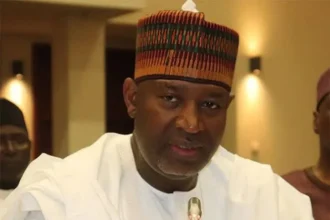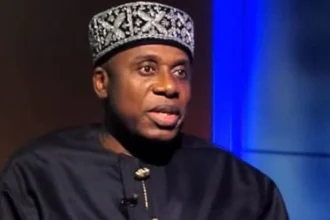...To get all news updates, Join our WhatsApp Group (Click Here)
Also Join our WhatsApp Channel (Click Here)
The Federal Government, under the administration of President Muhammadu Buhari, since 2015 till date, has been notoriously known for its penchant for disobeying court orders.
The Executives, alongside Security agencies, who are meant to uphold and execute the laws, occasionally neglect to obey or disregard judicial orders made by a court of competent jurisdiction.
The Rule of Law advocates for the supremacy of the law and the equality of persons before the law, as contained in the Sections 1 of the 1999 Constitution (as amended). Therefore, the exercise of governmental power ought to be conditioned by the law.
But, on the contrary, the executives and law enforcement agencies act as though they are above the law.
An obvious perversion of justice could be seen in Federal Government’s noncompliance to obey bail orders made by the court for the release of a former National Security Adviser, Sambo Dasuki and the leader of the Islamic Movement of Nigeria, Sheikh Ibraheem El-Zakzaky; his wife, Zeenat.
While Dasuki has been held by the State Security Service, since December 2015, when he was arrested over allegations of diverting $2.1 billion funds meant for the war against terrorism.
Despite several court orders, at least seven, made for his release since his arraignment before the Federal High Court, Abuja, the Federal government has refused to comply.
Also, the Court of Appeal, in a recent development, granted another bail in July 2019 and awarded a cost of N15 million as damages that the federal government should pay Dasuki, including cost of litigation. But no compliance has been made till date, as the government has also refused to obey the Appellant court.
Like Dauski, El-Zakzaky was arrested and detained since 2015 after a clampdown by the army that resulted in the death of over 300 Shiite members.
In 2016, when Mr El-Zakzaky was still being held without trial, a Federal High Court in Abuja ordered the SSS to release him and his wife on bail within 45 days.
The judge, Justice Gabriel Kolawole, also ordered the SSS to pay N50 million as damages to El-Zakzaky, but no compliance was ever made till date.
Notably, all these infamous attitudes of court disobedience by the FG are been practiced at the Federal High courts in Nigeria.
Again, same is happening now at a Federal High Court, Abuja, after the court faulted the decision of the Independent Corrupt Practices and other Related Offences Commission (ICPC) to freeze the accounts of Blaid Construction Limited and its director, Mrs. Ochuko Momoh.
ICPC had directed banks, including Union Bank Plc to freeze accounts and property belonging to Blaid and Mrs. Momoh, while claiming to be investigating their sources of income.
In a suit No. FHC/ABJ/CS/132/2019 filed by the plaintiff against its actions, Justice Binta Nyako frowned on ICPC’s conduct of failing to comply with an order made on March 5, 2019 directing them to unfreeze the accounts and property of both Blaid construction and Mrs Momoh.
The judge consequently ordered the commission to reverse its actions with regard to the plaintiffs’ assets and accounts. In her ruling on 2nd May, Justice Nyako insisted that ICPC must obey the court’s order, saying: “What I want ICPC to do is to first obey the court order and come back to seek any other prayers
“The defendant is to undo what it has done on February 6, 2019 when the defendant became aware that this matter is before this court, failing which you will be in contempt of court”.
However, sometime in April 2017, in suit No. FCT/HC/M/5388/17, the ICPC had approached the FCT High Court, Abuja, with a motion exparte seeking an interim order of forfeiture of sums of money belonging to the said company and its director.
In the suit, Mrs Ochuku Momoh and Blaid construction limited were both served as 1st and 2nd respondents, respectively. While the Federal Republic of Nigeria was named applicant.
Justice Olukayode A. Adeniyi, pursuant to the motion, granted an order of forfeiture of the sums of N2.9 billion and $1.6 million in the account No. 1692006432 belonging to Blaid Construction Limited domicile with Eco Bank on June 14, 2017.
The court also ordered the ICPC to take out paid adverts in two National Newspapers requesting on persons interested to show cause why the money should not be permanently forfeited to the Federal government.
The ICPC had alleged that, based on an intelligent report, the funds, which are subject-matter of the proceedings, were acquired illegally. The commission also said that efforts to trace the 2nd Respondent (Blaid construction), the owners of the account to come forward to explain the source of the funds proved abortive, as address of the company registered with the corporate affairs commission (CAC) was untraceable.
Hence, its actions to seize the funds in accordance with Sections 45 of the ICPC Act.
Also, as consequence, the 1st respondent (Mrs Momoh) deposed an affidavit to show cause on August 2, 2017 and a further affidavit to show cause on October 9, 2017.
Subsequently, five months later, after hearing arguments of both the Applicant and the Respondents, Justice Adeniyi delivered a ruling in favour of the Respondents and discharged the interim orders of forfeiture made on June 14 against the funds of the Respondents.
In the subsequent ruling, which was delivered on November 6, 2017, the judge said, “It has been clearly established that the exparte application for interim forfeiture order was filed outside the time prescribed by law; that the order was obtained by misrepresentation and concealment of facts on the part of the applicant.
“Part of the established facts is that the applicant concealed facts in obtaining from this court the interim forfeiture order made on June 14, 2017 against the funds in the company’s account at Eco Bank.
” Prior to the filing of the motion, the Respondents satisfactorily explained to the Applicant details of her business activities to which funds in her account at Eco bank are related, including the provision of a bond as requested by the Applicant.
“Contrary to the dispositions of Viscon W. Enyindah, the officer of the ICPC, that efforts to trace the directors proved abortive, the 2nd respondent, Mrs Momoh, in the capacity as the Director of the company, averred that she attended various interrogation session with the ICPC, since September 2015, at which she made extensive statements.
“Besides these facts, even though I am mindful that the provision of Section 48 (1) of the ICPC Act allows for property not subject to prosecution or conviction to be attached and forfeited to the Federal government in the certain circumstances, but the established position with this present case is that the Respondents have satisfactorily shown cause why the funds in context should not be forfeited”.
The judge noted that the case was a non-conviction based proceedings and therefore, that the chairman of the commission, before approaching the court with an application, must have ensured the properties for forfeiture was obtained as a result of or in connection with the commission of an offence provided in Section 8 to 19 of the ICPC Act.
” Therefore, I hereby set aside and discharge the interim orders of forfeiture made by this court on June 14, 2017 against the funds the 2nd respondent. The said funds, already forfeited and deposited in the interim in the Federal Government Recovery Account No: 1040480996 domicile with the Central Bank of Nigeria (CBN); shall be returned to the company forthwith. I make no orders as to costs,” Justice Adeniyi ruled.
But instead of awaiting an appeal judgement as an override to the ruling or complying with the ruling, the ICPC, on November 4, 2019 (two years after) published a press statement calming it has obtained an order of forfeiture from the same Justice Binta Nyako of the FCT High Court, Abuja. Refusing to mention the fact that Justice Binta Nyako had issued a restraining order against ICPC never to go near Mrs Momoh anymore.
ICPC, In the statement by the spokesperson for the commission, Rasheedat Okoduwa, said that the amount recovered from a former Managing Director of the Pipelines and Product Marketing Company, Haruna Momoh, as well as property illegally acquired and linked to him would be seized by the Federal Government after an interim forfeiture order was secured by the commission
The statement reads: “the ICPC has secured an interim forfeiture order from a High Court of the Federal Capital Territory, Abuja, to seize the stipulated amount comprising both local and foreign accounts in four different banks, as well as five landed properties located in different parts of Abuja.
“The commission, before approaching Justice O. A. Adeniyi, for the interim forfeiture order, had found through investigation that the former PPMC boss allegedly abused his position by using cronies and shell companies to divert government funds.
“He allegedly used Multi-Functions Nigeria Limited, Blaid Property Limited and Blaid Construction Limited to carry out several unlawful activities running into billions of naira. Contracts were secured for the companies from the Nigerian National Petroleum Corporation without any corresponding evidence of execution.
“Investigation revealed that N1.4bn was traced to six accounts in two different banks operated by Momoh’s wife, Eileen Momoh, who is the owner of Blaid Construction as shown by the incorporation details of the company.”
The statement said Momoh’s wife operated four bank accounts with the United Bank for Africa, where a combined exaggerated sum in foreign and local currencies was stashed, and two other accounts with Union Bank, where the commission found money that never existed.
It added, “The ICPC further discovered some amounts in three Stanbic IBTC bank accounts traced to Multi-Functions Nigeria Limited.
“The properties likely to be forfeited are Plot 199, Ebitu Ukiwe Street, Utako, Nos. 21, 22, 23 and 26 Olympia Estate, Kaura District, Plot 1824, Cadastral Zone, BO7, Katampe, plot 1827, Cadastral Zone, BO7, Katampe and No. 6 Casamance Street, Wuse Zone 3, all in Federal Capital Territory, Abuja.”
The ICPC noted that while granting the order, Justice Adeniyi ruled that the money be placed in an interest-yielding escrow accounts in the name of the commission.
Reacting to the new development and action of the ICPC, the Respondents lawyer, Ade A. Adedeji, SAN, said that the published statement by the commission was purely a calculated scheme to pervert justice.
According to him, “We have read the publications in the newspapers today and for the avoidance of doubt, we confirm that the order obtained by ICPC, which we have since confirmed through a search of the records of court is a calculated scheme by ICPC to pervert justice.
“Indeed, we can confirm that on 4th July, 2019, Blaid Group and Mrs. Momoh obtained judgment at the Federal High Court, which judgement permanently settled issues between parties in Suit No. FHC/ABJ/CS/132/2019. As it is also the right of parties, ICPC had appealed the judgment through filing of Notice of Appeal, etc.
“But rather than prosecute their appeal, they surreptitiously approached the FCT High Court and misled the court as if the appeal never existed and without disclosing to the new court that there was judgment of the Federal High Court against them, they moved the court ex-parte to grant an order of temporary forfeiture.
“The act of ICPC, which has become a pattern to score cheap publicity and enhance their deliberate scheme of boosting their image as hard-working and crime busters where there is none is a shame, a travesty of justice, a gross abuse of process of court and of power granted them under their enabling law which never anticipated it would be used for self-aggrandizement.
“This attitude needs to be condemned by every well-meaning Nigerian. It may also be of interest to note that in 2017, they had approached the FCT High Court obtained similar order, went to the press to run down the clients and their businesses.
“In similar pattern, they had concocted facts, misrepresented facts to court. In the ruling of court vacating/setting aside the order, the court in Suit No. FCT/HC/M/5388/17 had castigated ICPC for obtaining order fraudulently.
“We have identified Counsels that are often engaged to commit these atrocities and on clients’ instructions are considering the relevant provisions of Legal Practitioners’ Act as it relates to discipline of counsel in such circumstances.
“Grateful that our laws provide for necessary relief in the face of such reckless abuse and immediate steps are being taken to vacate the order. More importantly, we are also considering filing petitions against Counsel involved in misrepresenting facts to court to obtain ex-parte order which ordinarily would not have been granted.
“It is our responsibility to do everything possible lawfully to ensure this nonsense is abated”.
It is a gross abuse of court processes for ICPC to ignore the Judgement of 4th July and approach the FCT High Court in October, for an order of temporary forfeiture.
Especially in view of the fact that ICPC is already on Appeal, with respect to the 4th of July, Judgment.
And 2017 you got an interim forfeiture order. And upon hearing from both sides, the Judge quashed the order.
In 2019 you repeat the same exercise. Meanwhile the parties have not changed neither has the subject matter changed.
A gross abuse of court processes and disobedience of court orders.
Because, Binta Nyako ruled clearly that Mrs Momoh is not a public servant and never executed any contract in the public service and therefore doesn’t fall within the jurisdiction of ICPC. Justice Adeniyi ruled in similar vein in his Nov 2017 judgment.
In the judgement of 4th July by Binta Nyako, the main issue for determination was whether Mrs Momoh not being a Public officer falls within the contemplation of the ICPC Act.
And Justice Nyako ruling was clear and unambiguous; that ICPC has no jurisdiction over Mrs Momoh and issued an order restraining ICPC from ever investigating her. An order the ICPC has clearly disobeyed.
It is worthy of note that Mrs Momoh has been in business since 1992 and her Blaid Group employs over 500 Nigerians. The most interesting angle to this whole drama is that Mrs Momoh has never done any government contracts. And no government funds have been traced to any of her companies’ accounts by any security agencies. These facts are not in dispute.
It appears therefore that ICPC is merely pursuing Mrs Momoh solely on the basis that she is the wife of the ex-managing director of PPMC. They have not been able to present any evidence of her guilt to the court beside mere suspicious. Unfortunately the court deals with evidence not suspicion.
Are our security agencies now saying that the wives of government officials cannot engage in legitimate private businesses simply because their husbands are public servants? If that is the case, then the issue is better left to women groups to fight this battle themselves.
It is against this backdrop that one must commend the Attorney-General of the Federation and Minister of Justice, Abubakar Malami (SAN), for rising to the challenge of abuses by security operatives, by issuing official gazette and guidelines for the implementation of the National Anti-corruption Strategy. Which aims for more transparency and whittles down the powers of the Economic and Financial Crimes Commission and other anti-graft agencies as regards seizure of assets. The directive is contained in the Federal Republic of Nigeria Official Gazette Vol. 106, No 163, titled, ‘Asset Tracing, Recovery and Management Regulation 2019’, dated October 29, 2019.
The AGF directed in Part 3, Section 5(1) of the gazette that all non-conviction based forfeiture shall be conducted by his office.
He ordered that where a non-conviction based forfeiture procedure arose, the law enforcement agency and anti-corruption agencies should transfer the matter to the office of the AGF.
Section 5 states, “All non-conviction based forfeiture shall be conducted by the Office of the Attorney-General of the Federation.
It read, “Where a non-conviction based forfeiture procedure arises, the LEA (Law Enforcement Agency) and ACAs (Anti-Corruption Agencies) shall transfer the matter to the Office of the AGF.”
In the past, the EFCC had the power to initiate non-conviction based forfeiture as was done in the case of the EFCC and the wife of a former President, Patience Jonathan.
The new directive, however, implies that only the AGF can pursue such cases.
The gazette further states that all seized assets shall be registered by all the Ministries, Departments and Agencies.
It holds that all final forfeited assets recovered by agencies shall be handed over to the AGF within 60 days from the commencement of the regulations of management.
The AGF warned that any agency head who failed to follow the new guidelines would be dealt with.
It adds, “… Non–compliance with the regulations of these provisions and the guidelines and directions made pursuant to these regulations shall be considered insubordination and attract liability under the Public Sevice Rules.”
In another gazette with No 162, titled, ‘Guidelines for the implementation of the National Anti-Corruption Stategy 2017-2021, ‘ the AGF said all programmes regarding anti-corruption must be done with the express approval of his office.
Perhaps this move on the part of AGF would curb the overzealousness on the part of the security agencies. And they will now be compelled to carry out their investigations within the limits of the laws of the land and obey court orders and judgement
You can get every of our news as soon as they drop on WhatsApp ...To get all news updates, Join our WhatsApp Group (Click Here)
Also Join our WhatsApp Channel (Click Here)









